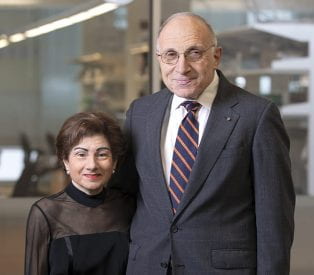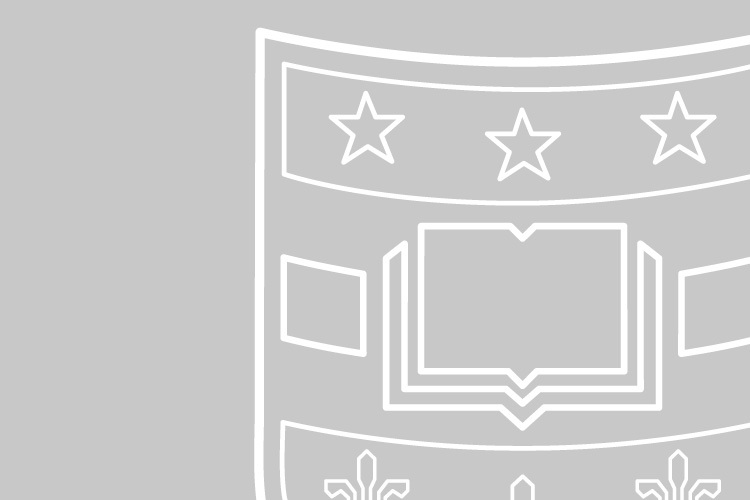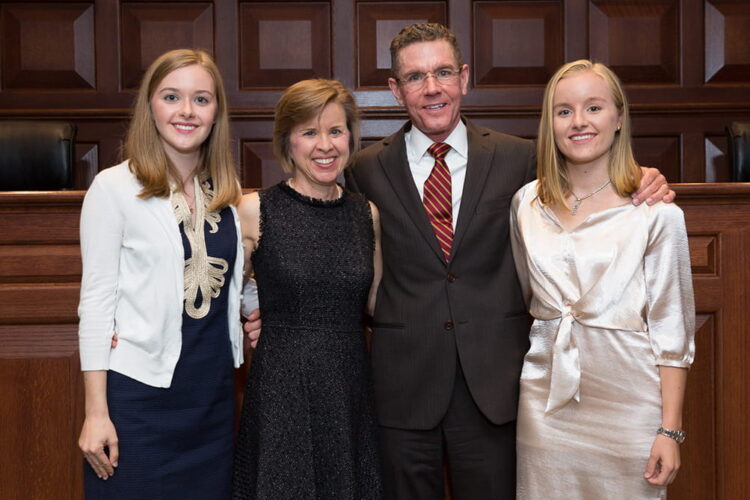During a celebrated career as a faculty member at Washington University School of Medicine and an executive in the pharmaceutical industry, Emeritus Trustee Philip Needleman learned what it takes to move a drug from the laboratory to the market. And he acquired a knack for identifying opportunities to succeed in that process. A longtime member of the medical school’s national council, Dr. Needleman has kept close tabs on advances at the school. Recognizing the potential of two promising areas of research, he and his wife, Sima, MSW ’74, a retired medical social worker and volunteer leader at the Brown School, have made a $15 million commitment to accelerate the development of new drugs to treat a wide range of conditions.

Sima and Philip Needleman’s latest gift will advance cutting-edge research aimed at developing new treatments for diseases that affect millions.
The gift provides expendable funding to establish two innovative centers at the School of Medicine. The Philip and Sima Needleman Center for Autophagy Therapeutics and Research, which will receive $10 million, will further a nascent area of biomedical study and play a key role in focusing the school’s efforts to address the aging process. The Philip and Sima Needleman Center for Neurometabolism and Axonal Therapeutics is being built around the breakthrough work of two faculty members who are pursuing new treatments for neurodegenerative disorders.
“We wanted to make a gift that is catalytic and leads to new therapeutics in the near term,” Dr. Needleman says. “I’ve been looking for really bright people at the medical school who have novel ideas that could have a great impact. I think we chose two areas that will be really important.”
According to David H. Perlmutter, MD, executive vice chancellor for medical affairs and the George and Carol Bauer Dean of the School of Medicine, the Needlemans’ gift reflects their passion for medical discovery and desire to improve human health. “Sima and Phil are dedicated partners who care deeply about our mission,” he says. “This gift will enable us to combine existing expertise in new ways across departments in order to fast-track the often long and cumbersome process of creating new drugs and other therapies.”
New Focus on Aging
Although it plays a critical part in maintaining cell health, the physiological process of autophagy was not widely known until recent years, when its emerging role in many diseases led to an explosion of interest in the field. The autophagy pathway functions as a recycling center for cellular debris, such as misfolded proteins, degradedlipids, and worn-down cell parts. When functioning optimally, it keeps many ailments and diseases at bay. But the process declines with age, opening the door to degenerative conditions that plague older adults.
“We wanted to make a gift that is catalytic and leads to new therapeutics in the near term. … I think we chose two areas that will be really important.”
– Emeritus Trustee Philip Needleman
Researchers at the Needleman Center for Autophagy Therapeutics and Research aim to help bring this vital process out of the margins and into the limelight. In order to prevent or treat age-related illnesses, they will work to identify and develop drugs that target key parts of the autophagy pathway. Their research has the potential to help patients with Alzheimer’s disease, cardiovascular disease, osteoporosis, cancer, and many other conditions.
Dr. Perlmutter, who will direct the center, envisions it as a key element of a signature School of Medicine initiative that centers on aging. Like the school’s personalized medicine initiative, the aging initiative will unite research efforts across the school and provide an infrastructure that promotes success. “With this center, we are establishing aging as a top priority of the school and beginning to make progress toward measurable outcomes,” Dr. Perlmutter says. “And we are excited to have Phil work closely with us every step of the way.”
The center will be one of the few in the country dedicated to autophagy, which was first observed by scientists in the 1960s. Research on the process blossomed in the 1990s after the identification of autophagy-related genes in yeast. “We intend to have a real impact by becoming a leading institution in this area,” Dr. Perlmutter says.
Exploiting a Discovery
While the autophagy center will be built from the ground up, the Needleman Center for Neurometabolism and Axonal Therapeutics creates a formal structure around a longstanding research partnership between Jeffrey Milbrandt, MD ’78, PhD, the James S. McDonnell Professor of Genetics and head of the Department of Genetics, and Aaron DiAntonio, MD/PhD, the Alan A. and Edith L. Wolff Professor of Developmental Biology, who will co-lead the center. The two began collaborating a decade ago to investigate the root causes of nerve degeneration, which is implicated in conditions such as Parkinson’s disease, amyotrophic lateral sclerosis (ALS), multiple sclerosis, glaucoma, and peripheral neuropathy.
The center will help Drs. Milbrandt and DiAntonio to build on a 2017 discovery that emerged from their cooperative work. The scientists and their collaborators had zeroed in on SARM1, a protein involved in the destruction of axons, the long nerve fibers that transmit electrical signals throughout the nervous system. Many researchers had studied the protein. However, none had uncovered what the Washington University team found: SARM1 is an active enzyme that is key to the degenerative process. This unexpected finding opened the door to future work to create a drug to block SARM1 from triggering axon degeneration. Moreover, Drs. Milbrandt and DiAntonio realized that thousands of proteins with scaffoldlike structures similar to SARM1 also could be active enzymes that may be similarly useful for developing new drugs.
The flexible funding provided by the Needlemans will allow the researchers to move quickly to exploit their discovery. “There’s a sense of urgency,” Dr. Milbrandt says. “This is the crowning achievement of our careers so far, and we want to be the ones to carry this work forward—we don’t want to wait for normal grant funding mechanisms to kick in. This gift will enable us to pull in collaborators now so we can drive the development of therapeutics.”
The researchers plan to focus their initial efforts on chemotherapy-induced peripheral neuropathy, a condition caused by nerve damage related to cancer treatment that is characterized by burning, numbness, and pain in the extremities. Their discovery also could lead to new drugs for other neurodegenerative conditions.
In addition to funding, the researchers have received valuable mentorship from Dr. Needleman, who has been meeting with them at a St. Louis Bread Co. café near his home. “We tell him about our project, and he offers advice and makes suggestions about the venture capital world and the pharmaceutical industry,” Dr. DiAntonio says. “His experience, contacts, and willingness to counsel us are helping to expedite the drug-development process.”
Motivated to Give Back
The Needlemans’ exceptional dedication to Washington University stems in part from a desire to give back to an institution that shaped their careers and lives. After earning a master’s degree in social work at the Brown School, Mrs. Needleman worked as a medical social worker at Jewish Hospital before its merger with Barnes Hospital. She began in the obstetrics department and later joined the staff of the in vitro fertilization (IVF) program. Led by Washington University faculty members, the program was the first to successfully perform IVF in Missouri, and Mrs. Needleman and her colleagues were among the vanguard in their work with IVF patients. She later opened a private practice.
“Working at Jewish Hospital was a very rewarding experience for me,” she says. “Because the early years of the IVF program involved so many disappointments, I helped many patients and staff members cope with the process.”
Mrs. Needleman has remained involved at Washington University through her service at the Brown School. She was a member of the school’s alumni board and completed a term as its president. She also has been a member of the Brown School National Council since 1998, serving in an emerita capacity since 2013. She received the Dean’s Medal from the school in 2006. She and her husband were awarded the William Greenleaf Eliot Society’s Search Award in 2011 in recognition of their outstanding contributions to the university.
Dr. Needleman’s relationship with Washington University began in 1964, when he came to the School of Medicine as a postdoctoral fellow. He continued his academic career as a faculty member in the pharmacology department, serving as department chair from 1976 to 1989. Widely recognized for his research on hypertension, he and his colleagues discovered the first angiotensin antagonist and atrial natriuretic factor, the hormone that allows the heart to communicate with the kidneys to modulate salt and water metabolism and blood pressure.
Separately, while studying the role of hormonelike substances called prostaglandins in arthritis, his lab discovered COX-2, a variation of the cyclooxygenase enzyme responsible for inflammation and pain in arthritis patients. After accepting a position with St. Louis-based Monsanto in 1989, Dr. Needleman led the development of the arthritis medication Celebrex, which inhibits COX-2. Approved by the FDA in 1998, the blockbuster anti-inflammatory drug has been used by millions of Americans.
Dr. Needleman, an elected member of the National Academy of Sciences and the National Academy of Medicine, was named president of Searle Research and Development, a subsidiary of Monsanto, in 1993. In 2000, he became senior executive vice president of Pharmacia following the merger of Monsanto and Pharmacia & Upjohn. In 2004, he briefly returned to the School of Medicine as an associate dean to help launch the BioMed 21 initiative. He joined Washington University’s Board of Trustees in 2002 and has served as an emeritus trustee since 2010. He has been a member of the medical school’s national council since 2002.
Supporting Exceptional Scientists
In addition to their service, the Needlemans have provided significant financial support for the School of Medicine and the Brown School. Through gifts to the medical school, they established the Dr. Philip Needleman Pharmacology Prize in 1989, the Philip and Sima K. Needleman Professorship in 2004, and the Philip and Sima Needleman Fellowships in Regenerative Medicine in 2013. At the Brown School, they have endowed three scholarships.
Much of their previous giving was motivated by a desire to help talented students achieve their full potential. Though their current gift focuses on research, at its root is a desire to invest in exceptional scientists. “I go back to my time in the laboratory and what would have had an impact on me,” Dr. Needleman says. “A gift like ours means that you don’t have to apply for grant funds every year. You can really stick to a problem and take risks.
“I have great confidence in the researchers we are supporting,” he adds. “Because I have lived in both academia and industry, I can see the special people who have that twinkle in their eye, who see over the horizon and know how to execute. I expect rapid progress from these two groups.”
Contact us to learn more about supporting advances in health care at Washington University School of Medicine.

